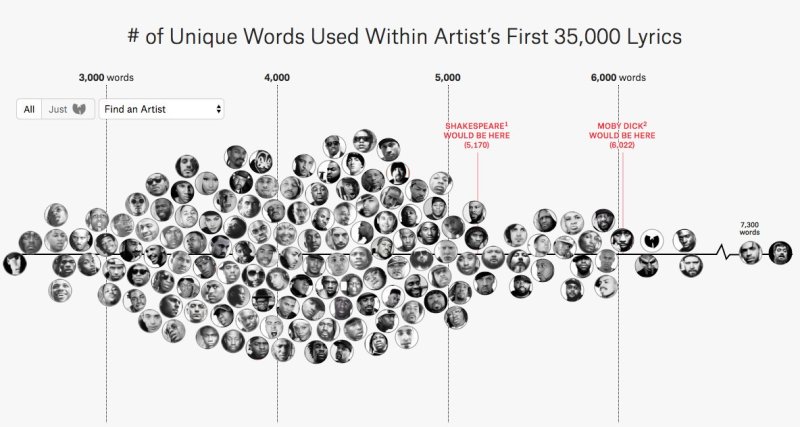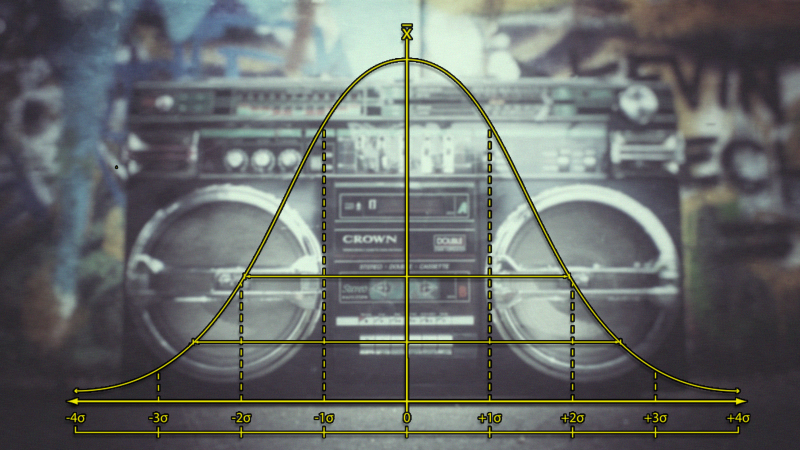Beats and rhymes are life in the world of hip-hop. A rapper’s ability to seamlessly merge the two is the mark of a master wordsmith. Ranking a rapper’s contributions to hip-hop will forever remain subjective, however [Matt] sought to apply a more quantitative approach to the matter. He created an interactive data set containing all the lyrics from over 150 rappers in order to determine which rapper’s vocabulary was the largest. Now everyone can know definitively which rapper’s rhymes truly are “the freshest”.
The study encompasses hip-hop artists from the last thirty years, pitting recent hit-makers like Lil Uzi Vert against veteran artists like KRS-One. To ensure everything is on even playing field [Matt] limited the study to the first 35,000 lyrics of each artist including any material on a mixtape, EP, or full album release. Rappers’ vocabulary was then plotted according to the total number of unique words found in their lyrics (i.e.: “shorty” and the alternative spelling “shawty” were each considered to be unique words). Oddly enough, there were some notable exclusions from the list as artists like Chance the Rapper, Queen Latifah, and The Notorious B.I.G’s discography did not exceed the 35,000 lyrics mark.
When digging into the data, there was a downward trend in the vocabulary used amongst popular artists of the last decade. [Matt] attributed this trend to the fact that many of these artists have modeled their music to reflect the pop/rock music structure that makes use of simple, repetitive choruses. While others may attribute this downward trend to a general lack of talent when it comes to lyricism, however, it should be noted that the economics of music streaming platforms have had an effect on the average song length. Though whatever era of hip-hop you subscribe to, it is always interesting to see where your favorite emcees rank.

















OY! I had hoped for a better analysis here. I won’t tell you folks what I think of the whole circle of that style, except it greatly resembles a rubbish tip.
It’s a pity the silent “c” in rap often get dropped.
I have to admit I was surprised that the unique word count was so high. In what I have been subjected to I would have put the numbers at least 2 orders of magnitude less. Maybe it’s just because it all sounds the same…..
I think the number of unique words in most forms of audible entertainment is fairly low.
Hahaha wow did you come up with that joke?
It’s akin to showing up in a thread about DOTA tactics just to talk about the fact that starcraft is your favorite.
My mom thought that was funny when I was a kid, and I’m old enough to remember smoking on planes.
Why would I care about rap in technical forum? Is this a slow need day?
It’s not about rap.
Maybe we can get Hackaday to repeat this “hack” story tomorrow … but alas, they’d likely market it as a
“Rep-Rap” story! 🤣🤣🤣
Rap rankings updated for 2019. That’s why this 5 year old article is going around again.
My fav, Weird Al, is still not listed.
How come Playboi Carti isn’t there?
1. Slang was counted as a unique word. “nahmsayin” is considered a unique word instead of 5 common words: “know what I am saying?”.
2. The plural, past tense, and other forms of the same word were counted as unique. From the article: “so pimps, pimp, pimping, and pimpin are four unique words”.
3. Different spellings of the same word are unique. “shorty vs. shawty” are two unique words.
4. Lyrical spelling of words is wildly different. Every Eminem “orange” lyric is spelled correctly. Master P has six different spellings of “orange” even though they all sound identical.
4. Because of the above, the more a lyricists slurs, the more they artificially increase “unique word count”.
5. Also, this is why rap has a higher word count than other forms of music. Pop songs don’t contain few unique words per song, they just contain few total words because they’re singing. You might have to count 100 pop albums to get 35k words, but that’s no reason the unique word count would be lower.
6. This is not a hack or even remotely related. This is like Marvel Universe time-line analysis or a mathematical breakdown of Pokemon. Bain Bechoff’s articles aren’t hacks, but at least they are somewhat hack related… even though he’s the primary reason for the quality of the comment section…. it’s better than this rap.
This isn’t a hack… That said, I’m glad you posted it. It’s still fun and interesting.
I’m shocked that Kendrick Lamar, 2Pac, and Run-D.M.C. are way down in boringsville while Jedi Mind Tricks is up by the top. It’s too bad there’s no way to quantify wordplay and cultural nuance. For instance, Aesop Rock is great but this analysis would lead you to believe his lyrics are smarter than everyone else’s, when they’re really more like rhyming dictionary word-soup. They sound great and he clearly uses more words than most, but they’re usually basically meaningless.
This analysis is pretty silly on a number of levels. Pretty much no one is judged on the number of words they use, but rather how they use them. Also this seems to punish the use of the pop music staple known as a chorus which is intentionally repetitive.
I like to give the example of comedian Mitch Hedberg, who told stories simple enough for a child to understand, but clever enough that you wouldn’t have thought of it on your own.
Story telling is art, and when you’re analyzing art on a tech website, you get a weird graph filled with arbitrary metrics that completely misses the point.
I totally agree with point 6, but I feel that I need to defend rap music here because there’s a weird amount of negativity about the genera going on in this comment section.
To address your points 1-5, I just ran the numbers for Kendrick Lamar, but I only counted words that show up in the dictionary (drastically under-counting by excluding valid vernaculars). I matched words ending in an apostrophe to their equivalent ending in ‘g’.
In his four EP’s Lamar had a total of 41,094 dictionary words, including 4,293 unique words. If you cut it off at 35,000 as was done in [Matt]’s blog post, Lamar used 3,900 unique dictionary words. That’s very slightly below the 4013 in [Matt]’s calculation, but not by much. I’d be willing to bet that his numbers hold up to any sort of normalization you could throw at them.
I don’t know why people are surprised by this. Rap is all about word play, so it shouldn’t be surprising that there are inherently more words used than would be in a song of any other genera. Granted, pop rap music combines the brain-dead lyricism of mainstream pop music with the aggressive posturing that people have come to expect from rap, but that shouldn’t be representative of the genera as a whole.
I listened to a lot of rap growing up. With my growing maturity I’ve grown a bit of distain for the genre. Yes, there are plenty of artists in ‘the game’ that are clean, but the genre as a whole rewards the objectification of women, praise of wealth by any means necessary, violence, drama in social interactions, recreational use of drugs and alcohol far beyond the point of excess, aaaand I could keep going. I used to think that rap was a symptom of the intercity issues and could be used as a healthy outlet for those in the situation rather than joining a gang, but now I see that it is just a tool that is used to perpetuate the problem capitalized on by record companies and producers. I no longer buy any rap music and I don’t plan on exposing my children to it purposefully.
* This was supposed to be a reply to Ali Ghane’s comment above. Not sure how it ended up as its own comment :/
Proof that vocabulary doesn’t make a good rapper. Some of the most successful are hidden in the middle meaning that true lyrical talent makes the difference.
I’d like to see where Fresh Prince(Will Smith) fits on this chart. I know he’s not current, but his raps were some of the most grammatically correct and easy to understand, ever.
Darn. This was going to be my entry in the Hackaday contest…